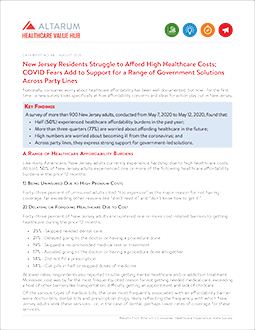New Jersey Residents Struggle to Afford High Healthcare Costs; COVID Fears Add to Support for a Range of Government Solutions Across Party Lines
Nationally, consumer worry about healthcare affordability has been well documented, but now—for the first time—a new survey looks specifically at how affordability concerns and ideas for action play out in New Jersey.
A Range of Healthcare Affordability Burdens
Like many Americans, New Jersey adults currently experience hardship due to high healthcare costs. All told, 50% of New Jersey adults experienced one or more of the following healthcare affordability burdens in the prior 12 months:
1) Being Uninsured Due to High Premium Costs
Forty-three percent of uninsured adults cited “too expensive” as the major reason for not having coverage, far exceeding other reasons like “don’t need it” and “don’t know how to get it.”
2) Delaying or Forgoing Healthcare Due to Cost
Forty-three percent of New Jersey adults encountered one or more cost-related barriers to getting healthcare during the prior 12 months:
- 25%—Skipped needed dental care
- 21%—Delayed going to the doctor or having a procedure done
- 19%—Skipped a recommended medical test or treatment
- 17%—Avoided going to the doctor or having a procedure done altogether
- 14%—Did not fill a prescription
- 14%—Cut pills in half or skipped doses of medicine
At lower rates, respondents also reported trouble getting mental healthcare and/or addiction treatment. Moreover, cost was by far the most frequently cited reason for not getting needed medical care, exceeding a host of other barriers like transportation, difficulty getting an appointment and lack of childcare.
Of the various types of medical bills, the ones most frequently associated with an affordability barrier were doctor bills, dental bills and prescription drugs, likely reflecting the frequency with which New Jersey adults seek these services—or, in the case of dental, perhaps lower rates of coverage for these services.
3) Struggling to Pay Medical Bills
Other times, New Jersey adults got the care they needed but struggled to pay the resulting bill. More than a quarter of New Jersey adults (26%) experienced one or more of these struggles to pay their medical bills:
- 9%—Contacted by a collection agency
- 8%—Used up all or most of their savings
- 8%—Unable to pay for basic necessities like food, heat or housing
- 7%—Racked up large amounts of credit card debt
- 5%—Placed on a long-term payment plan
- 5%—Borrowed money, got a loan or another mortgage on their home
High Levels of Worry About Affording Healthcare in the Future
In even greater numbers, New Jersey adults worry about affording healthcare in the future. Overall, more than three-fourths (77%) reported being “worried” or “very worried” about affording some aspect of healthcare in the future, including:
- 63%—Affording health insurance in the future
- 57%—Cost of a serious illness or accident
There is particular worry about affording care when elderly:
- 64%—Cost of nursing home and home care services
- 61%—Medical costs when elderly
The greatest concern about not being able to afford health insurance was among those with household incomes of $50,000 or below—71% of individuals in this group are worried (see Figure 1). Notably, residents with higher incomes also experienced high levels of worry about affording health insurance in the future—66% of those earning $50,000-$100,000 and 54% of those earning more than $100,000 are worried.
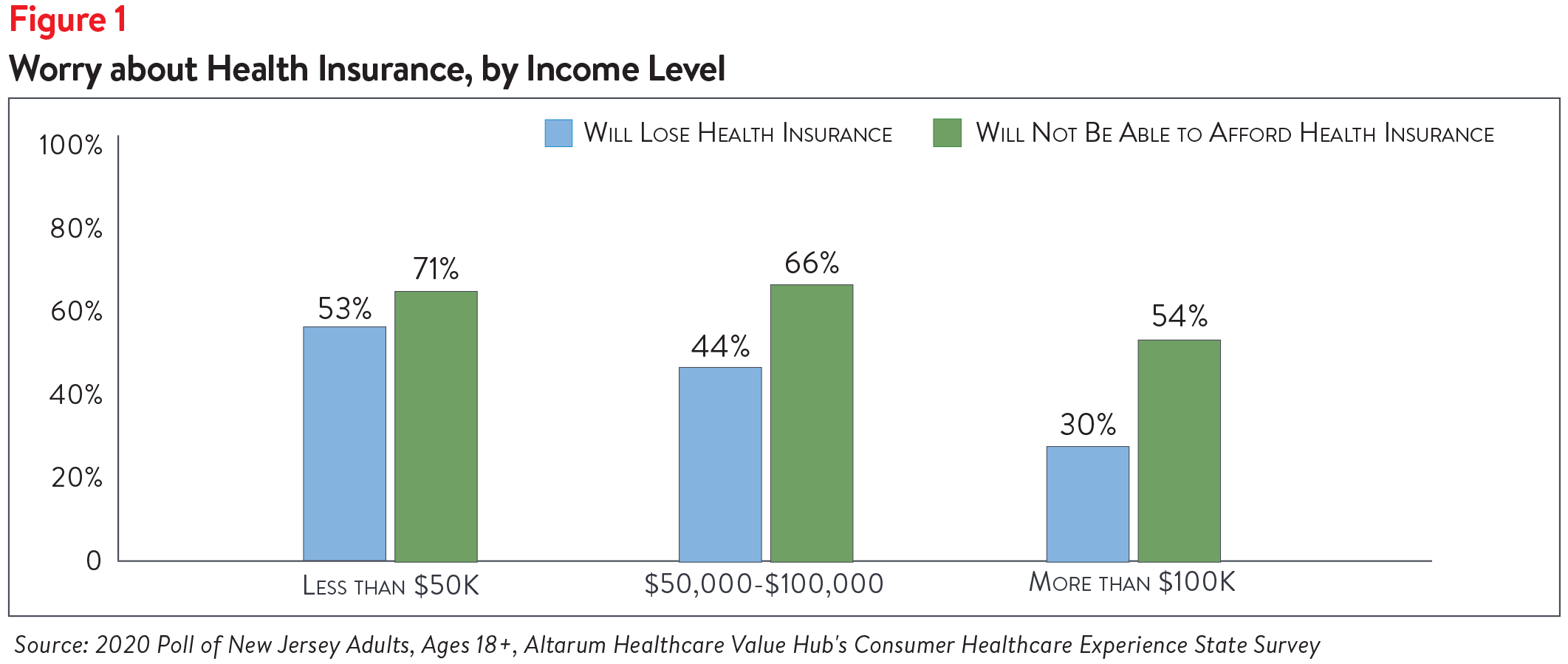
Regional Differences in Healthcare Affordability Burdens
The survey also revealed some regional differences in how New Jersey adults experience healthcare affordability burdens. Responses were grouped into the three regions shown in Figure 2.
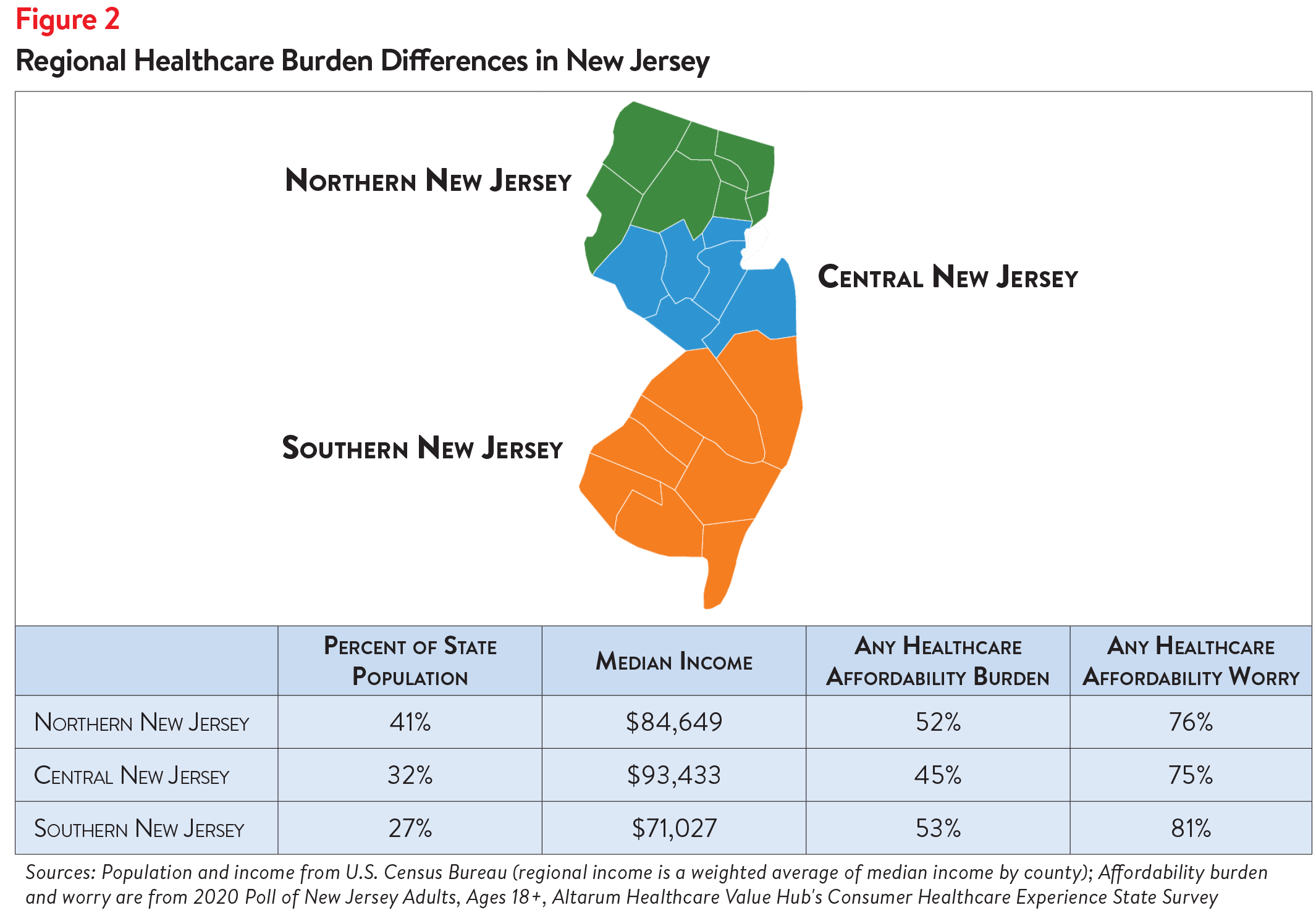
While all regions of New Jersey were very worried about affording healthcare in the future, Southern New Jersey reported the greatest levels of worry, at 81%. Consistent with its high median income, Central New Jersey reported the lowest healthcare affordability burdens—although 45% of adults had one or more of the burdens described above—while Northern and Southern New Jersey faced significantly higher healthcare affordability burdens (see Figure 2).
More detail is available in the 2020 regional New Jersey reports, which are available from:
www.healthcarevaluehub.org/new-jersey-healthcare-survey.
COVID Worries
In addition to affordability worries, questions were asked about respondents' top worries related to the COVID crisis.1 When asked if worried about “affording treatment of coronavirus/COVID-19 if you need it,” 60% of respondents were “worried” or “very worried.”
Separately, out of twelve possible responses, respondents were asked to pick the top three things they were most worried about (see Table 1). “Becoming ill from the virus,” not only ranked as the top worry among the choices, but it exceeded other worries by a wide margin, garnering about twice as many "votes" as the next most common worry, “Decreased value of retirement savings.”
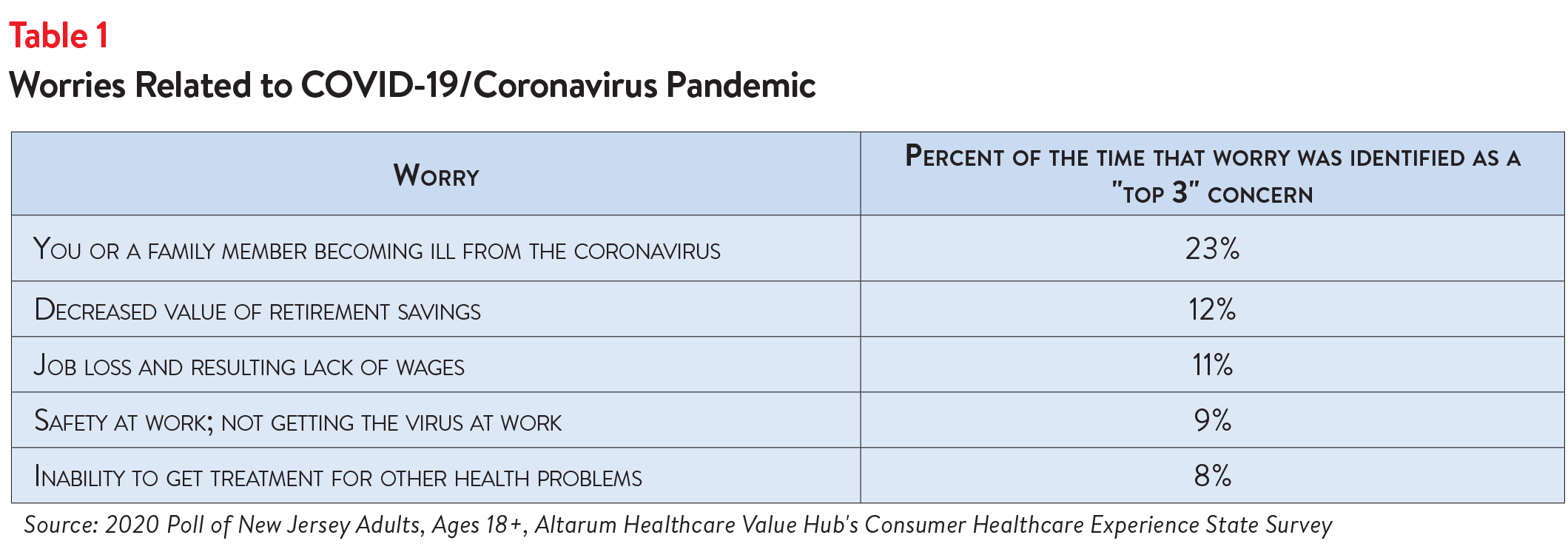
In smaller numbers, New Jersey adults worried about many other issues, including: struggling with anxiety/depression/other mental health issues (6%), job loss and resulting loss of health coverage (6%), affording treatment if someone in your family gets the virus (6%), COVID treatment isn't available in my area if I or a family member get sick (6%), children missing school/child care (5%), something else (5%), and ability to vote safely (4%).
Dissatisfaction with the Health System and Support for Change
In light of these healthcare affordability and COVID concerns, it is not surprising that New Jersey adults were extremely dissatisfied with the health system. Statewide:
- Almost three-quarters (72%) agreed or strongly agreed that “the system needs to change,”
- While just 29% agreed or strongly agreed that “we have a great healthcare system in the U.S.”
The survey asked about both personal and governmental actions to address health system problems.
Personal Actions
New Jersey adults do see a role for themselves in addressing healthcare affordability. When asked to rank the three personal actions that would be most effective in addressing the affordability of healthcare (out of ten options), top vote getters were:
- 64%—Taking better care of my personal health
- 36%—Research treatments myself, before going to the doctor
- 36%—Write or call my STATE representative asking them to take action
- 36%—Write or call my FEDERAL representative asking them to take action
They also reported specific actions they have already taken, like researching the cost of a drug beforehand (56%), as well as action they should be taking—72% said they would switch from a brand to a generic drug if given a chance.
Government Actions
Additionally, New Jersey residents see government as the key stakeholder that needs to act to address health system problems. Moreover, addressing healthcare problems trumps other issues that New Jersey residents want their elected representatives to work on.
At the beginning of the survey, respondents were asked what issues the government should address in the upcoming year. The top vote getters were:
- 68%—Economy/Joblessness
- 66%—Healthcare
- 51%—Taxes
The economic woes brought on by the COVID crisis likely contributed to “Economy/Joblessness” as a top concern, but addressing healthcare was a very close second in terms of what New Jersey adults want their elected representatives to work on.
When asked about the top three healthcare priorities the government should work on, top vote getters were:
- 56%—Address high healthcare costs, including prescription drugs
- 36%—Preserve consumer protections like: you can’t be denied coverage or charged more if you have a pre-existing medical condition
- 32%—Get health insurance to those who cannot afford coverage
Of more than 20 options, New Jersey adults believe the reason for high healthcare costs is unfair prices charged by powerful industry stakeholders:
- 72%—Drug companies charging too much money
- 68%—Insurance companies charging too much money
- 67%—Hospitals charging too much money
When it comes to tackling costs, respondents endorsed a number of strategies, including:
- 93%—Show what a fair price would be for specific procedures
- 93%—Make it easy to switch insurers if a health plan drops your doctor
- 92%—Expand health insurance options so that everyone can afford quality coverage
- 91%—Require hospitals and doctors to provide up-front cost estimates to consumers
- 91%—Require insurers to provide up-front cost estimates to consumers
Support for Action Across Party Lines
What is remarkable about the findings is high support for change regardless of respondents' political affiliation (see Table 2).
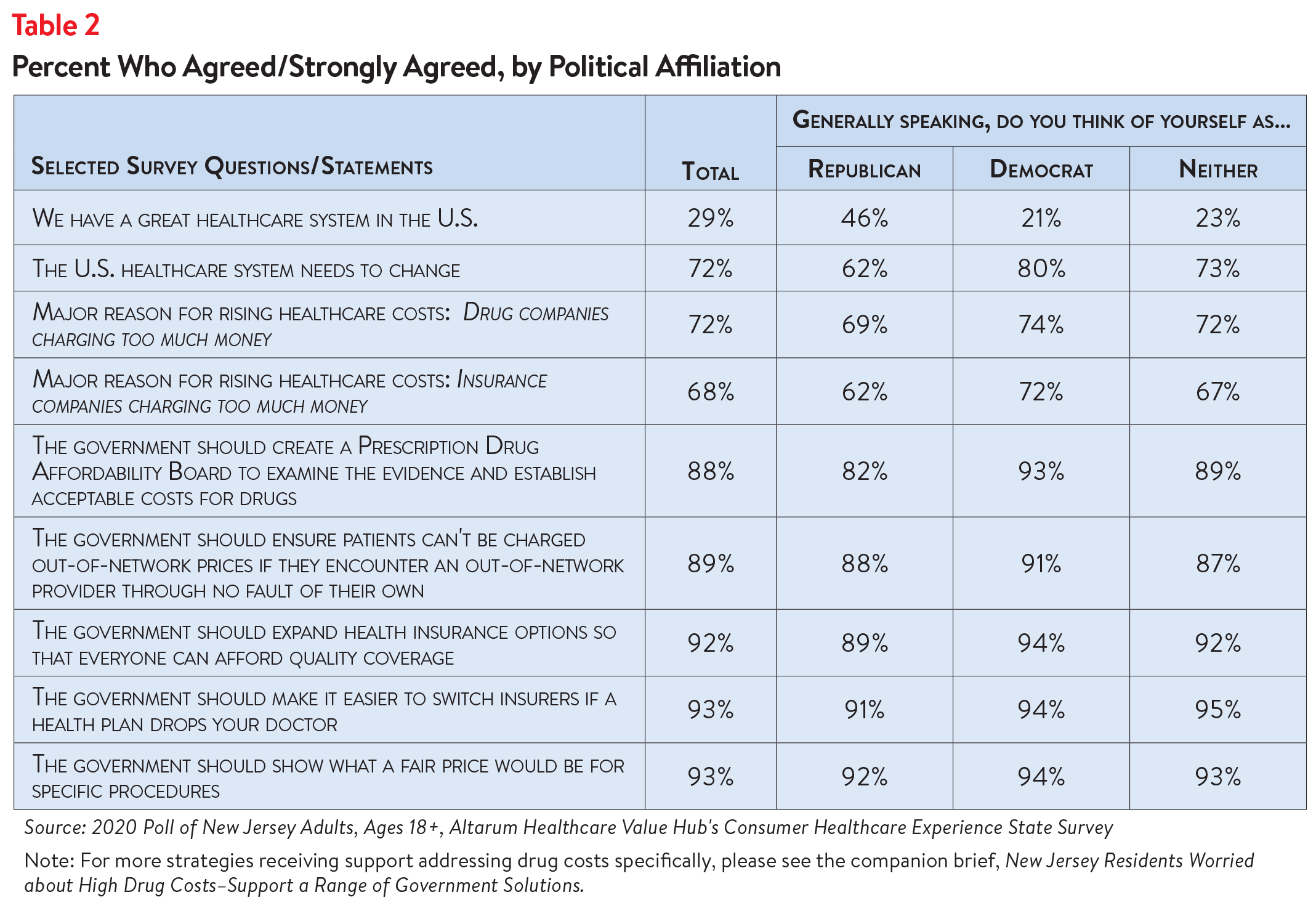
Policies to Address COVID Concerns
In addition to residents' views on the policies and approaches above, questions were asked about support for and against policies related to the COVID crisis.1 Out of eleven possible responses, respondents were asked to pick the top three policies that would help address COVID-related problems. There was significant diversity in the policies supported, with the front runner, “Improve public health emergency preparedness,” followed by a large group of policies receiving nearly equal numbers of votes (see Table 3). The least supported policy was “More financial help for large businesses.”
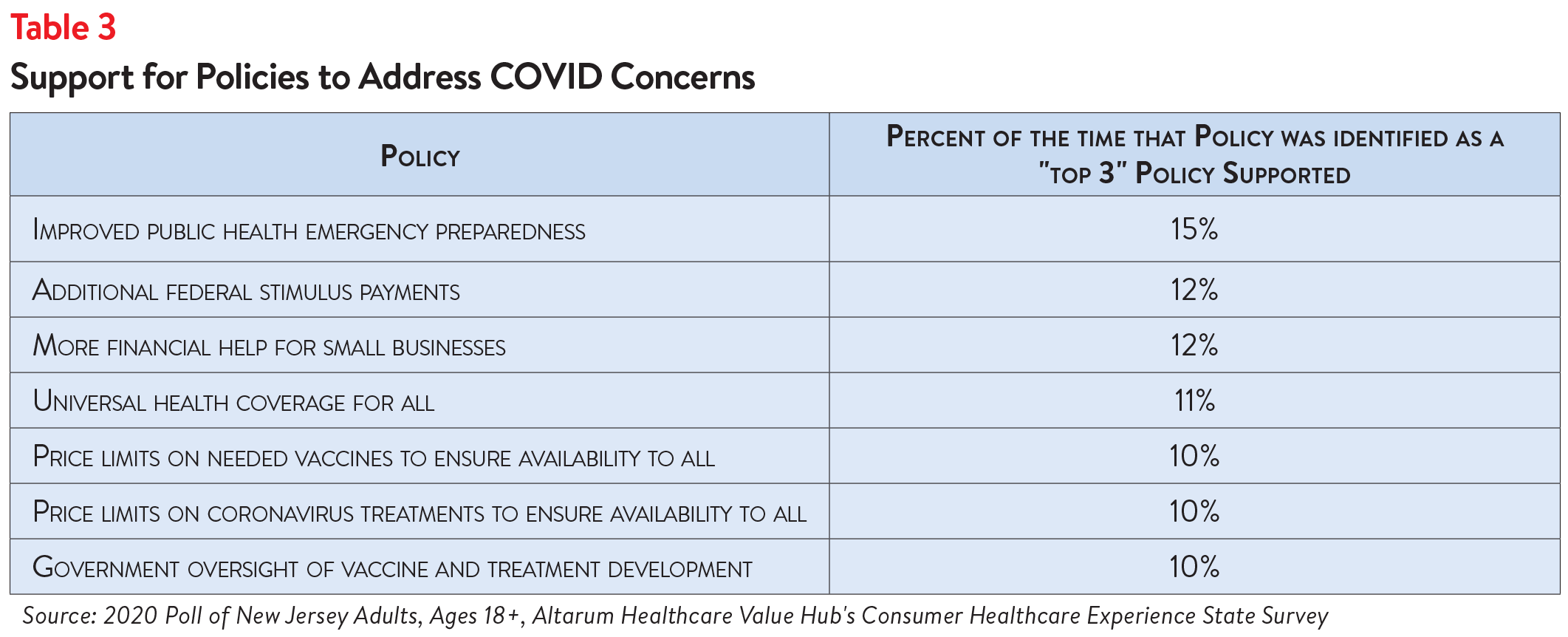
In smaller numbers, New Jersey residents reported support for other policies, including: “Mandatory paid time off for illness” (8%), “Unemployment benefits for gig workers” (7%), “Something else” (3%) and “More financial help for large businesses” (3%).
Far fewer respondents answered when asked about policies they did NOT support. Among the responses we received, 21% indicated that they did not support “More financial help for large businesses.” Trailing behind that (with 11% of the votes) was “Universal health coverage for all” (although more votes were cast overall in support). In this area, there was a lack of agreement across party lines, with Republicans far more likely to NOT support “Universal health coverage for all” as a means to address COVID-19 concerns, compared to Democrats and those not affiliated with either party (see Table 4). It is important to note, however, that when asked generically about “Expanding health insurance options so that everyone can afford quality coverage,” 92% of respondents agreed or strongly agreed with this policy as a means of improving affordability.
When asked about the policies they did NOT support, respondents were given the option of selecting “I support all of the policies listed.” Twenty-four percent of respondents selected this option.

The high burden of healthcare affordability, along with high levels of support for change, suggest that elected leaders and other stakeholders need to make addressing this consumer burden a top priority. Moreover, the current COVID crisis is leading state residents to take a hard look at how well health and public health systems are working for them, with strong support for a wide variety of actions. Annual surveys can help assess whether or not progress is being made.
Note
1. COVID-19 is the disease caused by the Coronavirus, which was characterized as a pandemic by the World Health Organization on March 11, 2020. For a comparison of how respondents from New Jersey and three other states answered our COVID questions, please see Healthcare Value Hub, How COVID Has Shaped Residents' Broader Attitudes Towards the Health System, Data Brief No. 86.


